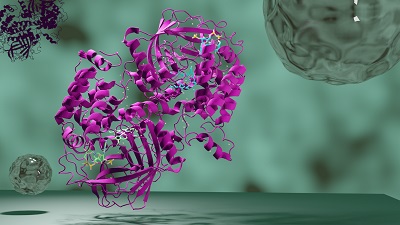
University of Queensland-led research could provide a glimpse into ‘nature’s secrets’ at the quantum level, thanks to an Office of National Intelligence Postdoctoral Grant.
The research will use state-of-the-art laser and optical technology to observe how enzymes – a critical element in biological reactions within all living cells – work with unprecedented detail.
Dr Pavlina Naydenova from UQ’s ARC Centre of Excellence in Quantum Biotechnology said the research could lead to the design of artificial enzymes that rival their natural counterparts.
“This would potentially lead to a variety of industrial applications within biotechnology, pharmaceuticals, and agriculture – the potential impact is immense,” Dr Naydenova said.
“And with that goal in mind, our research will investigate the most intricate mechanisms behind a critical process within all living cells, called enzyme catalysis.
“Put simply, this process is why enzymes can orchestrate some of the most complex biological reactions within living cells at remarkable speeds and efficiencies.
“For humans, these biological reactions involve anything from digestion to the transportation of oxygen through our blood.
“We will use technology built in-house at UQ to observe this process at a level of detail never seen before – the quantum level.”
Researchers believe furthering our understanding of this critical process could change the way we think about essential processes in life.
“Most of us go about our daily lives without paying much attention to the biochemistry that is happening in our cells and the living world around us at any given moment,” Dr Naydenova said.
“Enzymes can perform tasks that, in their absence, would otherwise take eons to complete.
“For example, the breaking of a peptide bond, a critical process in human digestion, would take as long as 400 years, but enzymes can achieve this in mere milliseconds.
“It is also critical to the transporting of oxygen throughout the body, a process which would take over two billion years without the enzyme catalysis.
“It’s a phenomenal biological process that begs so many questions we’re incredibly eager to explore further.
“By delving further into this mysterious world we hope to unveil some of nature’s most amazing secrets.”
Dr Naydenova is the recipient of an Office of National Intelligence National Intelligence Postdoctoral Grant (project number NIPG202310) funded by the Australian Government.
Media: Dr Pavlina Naydenova, p.naydenova@uq.edu.au; UQ Faculty of Science Media, science.media@uq.edu.au, +61 438 162 687.



